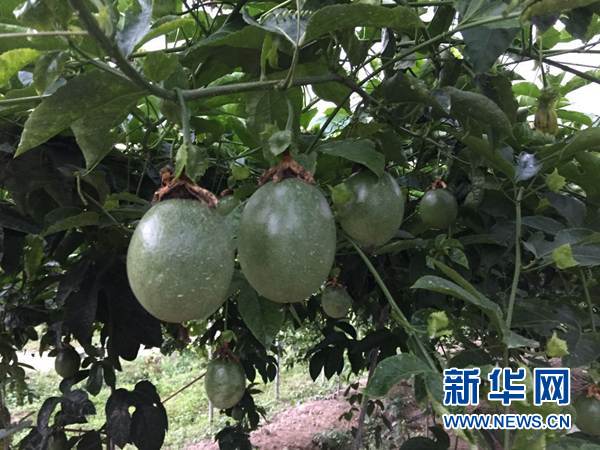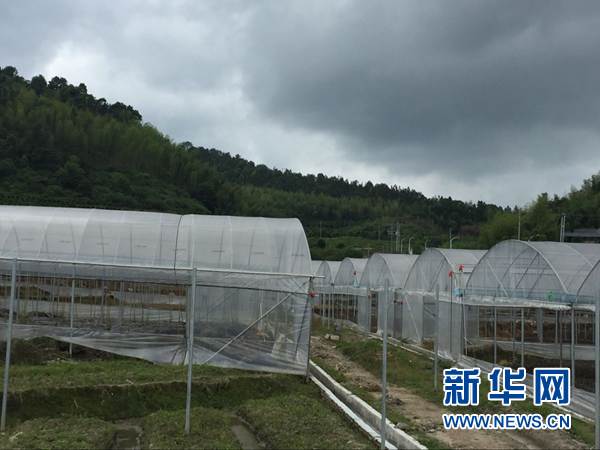Business and competition eliminate poverty in Fujian
p.china.org.cn,08 07, 2017 Adjust font size:
As stated in its government work report this year, Fujian plans to lift 200,000 people out of poverty. Through fostering distinctive businesses, building up the capacity of impoverished people, and introducing competition mechanisms, Xinluo District in Longyan is making an active contribution to achieving the target.
Distinctive businesses provide an escape route from poverty
“Located in the upper stream of the Chiu-lung River and the transitional area from south subtropical to mid-subtropical zone, Xinluo is sunny, cool in summer, and warm in winter,” says Li Jinguang, Director of the Xinluo Agriculture Bureau. “These natural advantages are well-suited for growing passion fruit, which require low input and less technology, but provide good harvests in a short period and achieve good economic returns. As a result, many farmers are becoming interested in cultivating passion fruit.”

Passion fruit grow well in the poverty alleviation base in Huangban Village, Baisha Town. [Photo by Zhang Fangling]
The rattan racks in the poverty alleviation base in Huangban Village are covered with flourishing passion fruit waiting for the upcoming harvest. Under its business introduction policy, Huangban arranged the transfer of land usage rights and succeeded in introducing Yuanbang Agritech Company to develop the passion fruit industry. Under the agreed contract, Yuanbang would lift all the households out of poverty by giving them priority in land leasing, employment and skill training.
According to Li, Xinluo created its passion fruit development plan in 2015. As the key focus of Fujian Agriculture Department this year, the plan aims to develop passion fruit into one of local distinctive industries. With a government-led approach, Xinluo will make continuous efforts in the cause, bringing cooperatives, leading enterprises and major growers together to help the impoverished households.
In addition to a unified passion fruit planting base in Huangban, there are 3 other standardized planting bases: Peixie Village in Xiaochi Town, Daoziyang Village in Xipo Street and Houlu Village in Yanshi Town. By April this year, the total area under passion fruit cultivation in Xinluo had reached 10,000 mu (1,647 acres) with an output of over 5,000 tons, generating more than 50 million yuan (U.S. $7.37 million) in revenues and lifting 243 households out of poverty.
In addition to the passion fruit industry, Xinluo also managed to alleviate poverty through businesses like under-forest economy, tourism, and animal husbandry. It supported 220 impoverished households engaged in bamboo forest reclamation, and 59 in bee keeping. The Peixie Rural Eco-tourism Cooperative was listed as a national demonstration project for “cooperative + farmers” tourism poverty alleviation, with 13 households taking part. To spur the local economy, tourism resources were consolidated into a self-driving route. District authorities also cooperated with the Chia Tai Group to raise chickens, lifting 4–8 villages out of poverty. Xinluo’s efforts to alleviate poverty through distinctive businesses are progressing steadily.
Competition stimulates the impoverished
Since the battle against poverty was initiated more than a year ago, many people have been freed from poverty through policy support and their own hard work. In contrast, some impoverished people are satisfied to simply sit and wait for government help. How to help these people out—how to provide the impetus for self-development to those who are unwilling to work—has become a new issue for Xinluo.
Early this year, the Xinluo government introduced competition to its poverty alleviation plan. “The government and enterprises set up a poverty alleviation resource platform,” says Xie Huiyan, Vice Director of the Xinluo Poverty Relief Office. “Then, through an open and fair process, impoverished people compete for projects, technology, funds, job opportunities and other support, all of which is being provided at low or zero cost. This encourages them to participate, and improves their sense of opportunity and ownership. Successful stories stimulate the confidence of other impoverished people. This method improves the efficient application of poverty alleviation funds.”

The Lvxianshan Vegetable Farm in Jiangshan Town builds about 200 mu (33 acres) of vegetable greenhouses. [Photo by Zhang Fangling]
The Lvxianshan Vegetable Farm in Jiangshan Town is one of the pilot sites of competitive poverty alleviation in Xinluo. A group of people who won the competition are now employed in ploughing the field and sowing seeds. The farm was established in 2008; to date it has built about 200 mu (33 acres) of vegetable greenhouses. It launched a pilot of the “farm + impoverished households” model in March. Integrating a range of different poverty alleviation funds, the government rents the existing vegetable greenhouse in stages, and provides each impoverished household with 1 mu (0.16 acre) of land for free. Eligible impoverished households then compete to rent the greenhouses from the government.
“To eliminate poverty, first create momentum,” says Qiu Jie, Deputy Chief of Jiangshan Town. “We introduced the competition mechanism with the goal of arousing the enthusiasm of impoverished people. We provide job offers to winners of the competition so that they can earn more pay for more work.”
Qiu explains that the town government rents land from the farm at a cost of 5,000 yuan (U.S. $737) per mu (0.16 acre). The farm takes on the responsibility of unified purchasing of seeds, fertilizer and other necessities, and then buys produce from impoverished households at the wholesale market price. The farm will distribute the net profit to impoverished households and ensure that each receives at least 8,000 yuan (U.S. $1,180) per annum. The farm is also responsible for establishing professional cooperatives that provide one-stop services in areas such as information consulting, technical guidance, disease prevention, and sales. Poverty alleviation workers conduct follow-up and monitoring throughout the process.
In terms of how the competition mechanism works, Huang Xuanshen, the owner of the Lvxianshan Vegetable Farm, explains that impoverished households submit a voluntary application. This is then evaluated by village leaders, cadres, the village level CPC Party branch, the village committee, and facilitators. Enterprises offer jobs to impoverished households according to their ranking. In March this year, the first 20 impoverished farmers had already been provided with work on the farm. The farm will carry out a comprehensive annual assessment of all the impoverished households involved, and the last 2 households below the basic score will be removed from the scheme.
Based on trial and experience, Xinluo has produced competitive poverty alleviation models in job opportunities, project cooperation, poverty alleviation funds, substantial support and collective resources. The models are currently being promoted across Xinluo: some villages in Dachi Town plan to rent land for impoverished households to grow peanuts; Suban Town is cooperating with major goat breeders to involve impoverished people in goat breeding; the Chia Tai Group is establishing a chicken-breeding base to encourage impoverished households to compete for shares.
Xinluo has introduced competition into its strategy for the war against poverty in order to stimulate self-development among impoverished households, which will allow locals both to benefit from external momentum and to generate their own impetus. The goal is to lift 4,691 impoverished people in the district out of poverty, and create new methods of bringing modern life and its conveniences to the old revolutionary base areas.